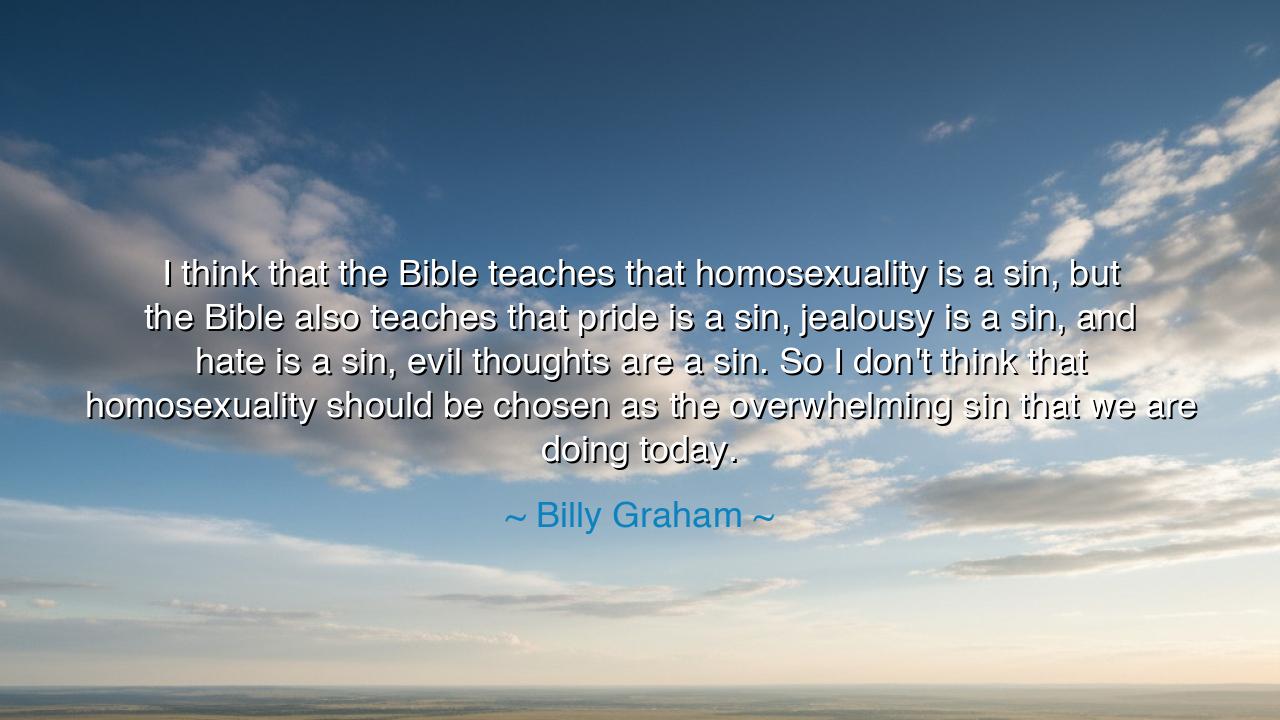
I think that the Bible teaches that homosexuality is a sin, but
I think that the Bible teaches that homosexuality is a sin, but the Bible also teaches that pride is a sin, jealousy is a sin, and hate is a sin, evil thoughts are a sin. So I don't think that homosexuality should be chosen as the overwhelming sin that we are doing today.






In the tender yet firm voice of Billy Graham, the shepherd of millions and the conscience of a generation, came these profound words: “I think that the Bible teaches that homosexuality is a sin, but the Bible also teaches that pride is a sin, jealousy is a sin, and hate is a sin, evil thoughts are a sin. So I don't think that homosexuality should be chosen as the overwhelming sin that we are doing today.” These words, born of compassion and conviction, echo the deeper wisdom of grace—that no sin is greater than another in the eyes of God, and that judgment without love is not righteousness, but arrogance clothed in faith. In this teaching, Graham sought not to condemn, but to remind humanity of the humility of the heart that true spirituality demands.
The meaning of this quote flows from the central river of Christian understanding: that all men fall short of perfection, and that no one stands above another in moral worth. Sin, in Graham’s view, is the universal inheritance of mankind—a shadow that touches every soul, whether in thought, in deed, or in silence. Yet, over time, societies have often magnified certain sins while turning a blind eye to others, creating a hierarchy of condemnation that serves pride more than holiness. Graham’s message was a plea for balance and mercy: that judgment must walk hand in hand with humility, and that one should be as swift to examine the sins of one’s own heart as to speak of another’s.
His words were not of indulgence, but of understanding. For Billy Graham was a preacher who believed in the transforming power of grace. He had seen how anger disguised as piety could wound the soul of religion itself. He knew that when people singled out others’ flaws to elevate themselves, they betrayed the very essence of the gospel they claimed to defend. Pride—the sin of the Pharisee—was no less corrupting than lust, and hatred no less damnable than any other transgression. In reminding the world of this, Graham did not weaken moral truth; he purified it, restoring compassion where condemnation had taken root.
History gives us a reflection of this eternal principle in the story of Jesus and the woman taken in adultery. The crowd brought her forth, stones ready, shouting for her death according to law. Yet Christ, calm as the morning, wrote upon the dust and said, “He that is without sin among you, let him first cast a stone.” One by one, their hands fell empty, for none were blameless. That moment, radiant and eternal, embodied the spirit of Graham’s words—no sin should be chosen as the overwhelming sin, for in condemning others, we expose our own frailty. True righteousness is not in the hand that casts the stone, but in the heart that forgives.
Graham’s insight strikes at the very center of moral hypocrisy. When society chooses a particular fault as its favorite sin to hate, it ceases to act from love and begins to act from fear or pride. It forgets that the greatest commandment is not to judge, but to love—to love God and love one another. A heart consumed with scorn for another’s sin cannot see its own darkness. It was this blindness that Graham warned against: a faith without mercy, a truth without tenderness, a zeal without humility.
The deeper lesson of his words is that all sin is part of the human condition, but so is the possibility of redemption. Every man carries both the stain of error and the spark of divine image. When we single out others’ failings as worse than our own, we close the door to our own growth. But when we recognize our shared imperfection, we open the door to understanding, compassion, and transformation. The purpose of moral law is not to humiliate, but to heal—to bring light into shadow, not to extinguish it.
Therefore, let the followers of wisdom and faith remember this: be firm in conviction, but gentle in judgment. Speak truth, but let truth be wrapped in love. Condemn not the sinner, for the same darkness dwells within all hearts. Be wary of pride, for it is the quietest of sins and the deadliest of all. Instead, cultivate humility—the soil in which forgiveness grows.
And so, Billy Graham’s words stand not merely as a moral statement, but as a call to the higher path of humanity: that justice without mercy is cruelty, and truth without compassion is emptiness. Let those who seek righteousness learn to balance the scales—not by weighing others’ sins heavier, but by lightening them with love. For in the end, it is not how harshly we judged others that will matter, but how deeply we understood them, and how much grace we gave where once we might have condemned.






AAdministratorAdministrator
Welcome, honored guests. Please leave a comment, we will respond soon